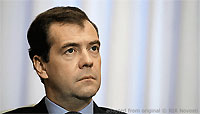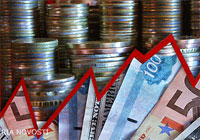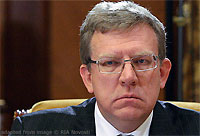Putin's Spending May Cripple Medvedev as Kudrin Eyes His Job
Henry Meyer, Jason Corcoran - Bloomberg - bloomberg.com - 3.23.12 - JRL 2012-55
Dmitry Medvedev may struggle to hold onto his new post as Russian prime minister as the budget buckles and the finance official he ousted waits in the wings to take over, investors and analysts from Moscow to London say.

The president, who's stepping aside to allow Vladimir Putin to reclaim the Kremlin spot he occupied from 2000 to 2008, faces a widening fiscal deficit when taking over as premier in May after his mentor promised $160 billion in extra spending such as pensions and state salaries before being re-elected on March 4.
The budget, which posted a shortfall of 6 percent of gross domestic product in 2009 after oil prices sank, may need crude to average a record $150 a barrel to balance by 2014, Citigroup Inc. predicts. A budget crisis may test the president-elect's loyalty to Medvedev and open the door for Alexei Kudrin, a Putin ally who in 11 years as finance minister cut state debt to less than 10 percent of GDP and posted nine fiscal surpluses.
"Most people think Medvedev won't last long in that role," Robert Procope, a London-based fund manager with Charlemagne Capital, which oversees $3 billion including Russian shares, said March 16 by phone. "He seems to be a crippled figure, shorn of any credibility."
Credit Outlook Cut

Fitch Ratings, which lowered its outlook on Russia's BBB credit rating to negative in January, warned this month that a failure to tighten public finances accompanied by a "severe and sustained" drop in oil prices would damage the economy and may lead to a credit downgrade.
While Urals crude oil, Russia's main export, is trading at about $120 a barrel, $3 above the price needed to balance this year's budget, a weaker global economy may force the price down next year. The high price of oil, along with Putin's election, has helped push the MICEX (INDEXCF) stock index up 11 percent and the ruble 9.8 percent higher to the dollar since January.
Crude prices could potentially fall below $100 next year, meaning Russia may face an "expanding" budget deficit unless the government cuts spending and proceeds with plans to sell assets, according to Chris Weafer, chief strategist at Troika Dialog, the investment bank owned by state-run OAO Sberbank.
"The next government is going to have a really tough time from the middle of next year," Weafer said March 15 by phone. "It will face tougher decisions from 2013 and 2014, and we may see changes in terms of who's in the various seats."
'Commodity Supercycle'
Citigroup Inc. warned that the "Russian investment case" will have to change because the "commodity supercycle" on which it is based has peaked and prices are likely to fall in the coming years, according to a report emailed today.
"The saving grace for Russia is that the market is a play on energy, and energy is a late cycle commodity," analysts Kingsmill Bond and Andrey Kuznetsov, wrote. "The near-term problems about to face the metals sector may therefore act as an early warning system for Russia." Putin may raise taxes on mining to fund his spending programs, Troika Dialog said.

Kudrin said in a radio interview in December that he may be offered the premiership, adding that Medvedev's authority had fallen "significantly" after he agreed to make way for Putin.
The former finance minister would insist on Putin reneging on some of his pre-election spending promises as a condition for taking the prime minister's job, as he wouldn't agree to become a "cashier to dole out money for populist reasons," said a former Kremlin adviser, Gleb Pavlovsky. Medvedev, who won't have such autonomy, will last "a maximum of a year," Pavlovsky, head of the Moscow-based Effective Policy Foundation, said in a March 22 interview.
Bullish Story
"Part of the bullish story by certain investors is that Kudrin will come back as prime minister and lead a highly effective regime," Bond, chief strategist at Citigroup in Moscow, said by phone.
Kudrin was forced to resign by Medvedev in September after saying he wouldn't work in a Cabinet led by the president because he opposed plans to spend 2.1 trillion rubles ($72 billion) more on defense through 2014. Government expenditure is reaching a critical level, he said the next month.
Kudrin proposes raising the retirement age to as high as 63 years for men and 62 years for women, saying life expectancy will average 75 years by 2050, up from 69 years now. The Organization for Economic Cooperation and Development and the World Bank back an increase. Putin ruled out such a move in his election campaign.
Pension Spending
Pension spending accounts for a fifth of the budget, Citigroup estimates. The pension gap will reach 1.75 trillion rubles in 2012 from 875 billion rubles last year, Deputy Health and Social Development Minister Yury Voronin said in October. That's 3 percent of the Finance Ministry's 2012 GDP forecast.
"The fundamental difference is we know Kudrin's ability to control the purse strings," Charles Robertson, global chief economist at Renaissance Capital, said March 15 by phone.
Even with his ally Kudrin lurking in the wings, Putin, whose new term runs to 2018, may be loathe to backtrack on his promise to swap jobs with Medvedev, according to Michael Kart, managing partner at hedge fund company Spectrum Partners Ltd, which manages $150 million in assets.
Wishful Thinking
"Kudrin returning could be wishful thinking on the part of some investors as Putin made it clear Medvedev will be the next prime minister and that the 'tandem' will be able to deliver on its reform agenda," Kart said March 16 by phone.
Furthermore, the government forecasts little fiscal danger. The budget gap will narrow to 0.7 percent of GDP in 2014 from 1.5 percent this year, according to a marketing presentation for a government Eurobond sale obtained by Bloomberg News.
The budget's break-even oil price will start declining after growing "substantially" in recent years, the authors of the presentation wrote.
Still, Renaissance predicts a Medvedev administration would spend more than one headed by Kudrin. Russia's state debt is likely to rise toward 50 percent of GDP from 11 percent within five years if the current president were premier, compared with 20 percent under Kudrin, it said.
Kudrin's "preference for a very low level of government debt" bolsters calls for his appointment as prime minister in the coming years, according to Renaissance's Robertson.
"Investors would love to see Kudrin in a powerful position in Russia and prime minister would obviously be a powerful position," he said from London. "At some point in the future he's a very credible candidate."
©2012 BLOOMBERG L.P. ALL RIGHTS RESERVED; article also appeared at www.bloomberg.com/news/2012-03-22/putin-s-spending-may-cripple-medvedev-as-kudrin-eyes-his-job.html
Keywords: Russia, Government, Politics - Russia, Economy, Budget - Russian News - Russia
Dmitry Medvedev may struggle to hold onto his new post as Russian prime minister as the budget buckles and the finance official he ousted waits in the wings to take over, investors and analysts from Moscow to London say.

The president, who's stepping aside to allow Vladimir Putin to reclaim the Kremlin spot he occupied from 2000 to 2008, faces a widening fiscal deficit when taking over as premier in May after his mentor promised $160 billion in extra spending such as pensions and state salaries before being re-elected on March 4.
The budget, which posted a shortfall of 6 percent of gross domestic product in 2009 after oil prices sank, may need crude to average a record $150 a barrel to balance by 2014, Citigroup Inc. predicts. A budget crisis may test the president-elect's loyalty to Medvedev and open the door for Alexei Kudrin, a Putin ally who in 11 years as finance minister cut state debt to less than 10 percent of GDP and posted nine fiscal surpluses.
"Most people think Medvedev won't last long in that role," Robert Procope, a London-based fund manager with Charlemagne Capital, which oversees $3 billion including Russian shares, said March 16 by phone. "He seems to be a crippled figure, shorn of any credibility."
Credit Outlook Cut

Fitch Ratings, which lowered its outlook on Russia's BBB credit rating to negative in January, warned this month that a failure to tighten public finances accompanied by a "severe and sustained" drop in oil prices would damage the economy and may lead to a credit downgrade.
While Urals crude oil, Russia's main export, is trading at about $120 a barrel, $3 above the price needed to balance this year's budget, a weaker global economy may force the price down next year. The high price of oil, along with Putin's election, has helped push the MICEX (INDEXCF) stock index up 11 percent and the ruble 9.8 percent higher to the dollar since January.
Crude prices could potentially fall below $100 next year, meaning Russia may face an "expanding" budget deficit unless the government cuts spending and proceeds with plans to sell assets, according to Chris Weafer, chief strategist at Troika Dialog, the investment bank owned by state-run OAO Sberbank.
"The next government is going to have a really tough time from the middle of next year," Weafer said March 15 by phone. "It will face tougher decisions from 2013 and 2014, and we may see changes in terms of who's in the various seats."
'Commodity Supercycle'
Citigroup Inc. warned that the "Russian investment case" will have to change because the "commodity supercycle" on which it is based has peaked and prices are likely to fall in the coming years, according to a report emailed today.
"The saving grace for Russia is that the market is a play on energy, and energy is a late cycle commodity," analysts Kingsmill Bond and Andrey Kuznetsov, wrote. "The near-term problems about to face the metals sector may therefore act as an early warning system for Russia." Putin may raise taxes on mining to fund his spending programs, Troika Dialog said.

Kudrin said in a radio interview in December that he may be offered the premiership, adding that Medvedev's authority had fallen "significantly" after he agreed to make way for Putin.
The former finance minister would insist on Putin reneging on some of his pre-election spending promises as a condition for taking the prime minister's job, as he wouldn't agree to become a "cashier to dole out money for populist reasons," said a former Kremlin adviser, Gleb Pavlovsky. Medvedev, who won't have such autonomy, will last "a maximum of a year," Pavlovsky, head of the Moscow-based Effective Policy Foundation, said in a March 22 interview.
Bullish Story
"Part of the bullish story by certain investors is that Kudrin will come back as prime minister and lead a highly effective regime," Bond, chief strategist at Citigroup in Moscow, said by phone.
Kudrin was forced to resign by Medvedev in September after saying he wouldn't work in a Cabinet led by the president because he opposed plans to spend 2.1 trillion rubles ($72 billion) more on defense through 2014. Government expenditure is reaching a critical level, he said the next month.
Kudrin proposes raising the retirement age to as high as 63 years for men and 62 years for women, saying life expectancy will average 75 years by 2050, up from 69 years now. The Organization for Economic Cooperation and Development and the World Bank back an increase. Putin ruled out such a move in his election campaign.
Pension Spending
Pension spending accounts for a fifth of the budget, Citigroup estimates. The pension gap will reach 1.75 trillion rubles in 2012 from 875 billion rubles last year, Deputy Health and Social Development Minister Yury Voronin said in October. That's 3 percent of the Finance Ministry's 2012 GDP forecast.
"The fundamental difference is we know Kudrin's ability to control the purse strings," Charles Robertson, global chief economist at Renaissance Capital, said March 15 by phone.
Even with his ally Kudrin lurking in the wings, Putin, whose new term runs to 2018, may be loathe to backtrack on his promise to swap jobs with Medvedev, according to Michael Kart, managing partner at hedge fund company Spectrum Partners Ltd, which manages $150 million in assets.
Wishful Thinking
"Kudrin returning could be wishful thinking on the part of some investors as Putin made it clear Medvedev will be the next prime minister and that the 'tandem' will be able to deliver on its reform agenda," Kart said March 16 by phone.
Furthermore, the government forecasts little fiscal danger. The budget gap will narrow to 0.7 percent of GDP in 2014 from 1.5 percent this year, according to a marketing presentation for a government Eurobond sale obtained by Bloomberg News.
The budget's break-even oil price will start declining after growing "substantially" in recent years, the authors of the presentation wrote.
Still, Renaissance predicts a Medvedev administration would spend more than one headed by Kudrin. Russia's state debt is likely to rise toward 50 percent of GDP from 11 percent within five years if the current president were premier, compared with 20 percent under Kudrin, it said.
Kudrin's "preference for a very low level of government debt" bolsters calls for his appointment as prime minister in the coming years, according to Renaissance's Robertson.
"Investors would love to see Kudrin in a powerful position in Russia and prime minister would obviously be a powerful position," he said from London. "At some point in the future he's a very credible candidate."
©2012 BLOOMBERG L.P. ALL RIGHTS RESERVED; article also appeared at www.bloomberg.com/news/2012-03-22/putin-s-spending-may-cripple-medvedev-as-kudrin-eyes-his-job.html